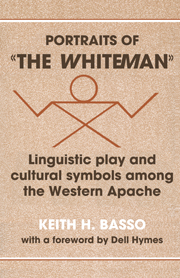Book contents
5 - Changing portraits of “the Whiteman”
Published online by Cambridge University Press: 05 July 2015
Summary
When a people can laugh at themselves and others and hold all aspects of life together without letting anybody drive them to extremes, then it seems to me that people can survive.
—Vine Deloria, Jr. (Custer Died for Your Sins: An Indian Manifesto)Like everything else sociocultural, systems of morality and the symbols in which they find expression are subject to modification and change. Here, too, Western Apache joking performances are instructive. I began investigating imitations of Anglo-Americans in the summer of 1965, and although I did not pursue the project with the diligence I now wish I had, the early materials suggest some interesting things. It is clear, for example, that the characters portrayed in jokes are almost always role-specific, and that the fabricated encounters in which these characters appear are highly sensitive to current events. Like political cartoonists and calypso singers, Apache jokers make a point of keeping up with the times.
In 1966 and 1967, Apaches at Cibecue portrayed ‘the Whiteman’ as hippie – mumbling, awkwardly effeminate, and, as one of my consultants put it, ‘rich but pretending poor.’ In 1970, VISTA volunteers descended on the community, and before long they were also providing materials for secondary texts. ‘The Whiteman’ as VISTA worker was gushingly altruistic, hopelessly incompetent at simple manual tasks, and, for some reason I was never able to pin down, invariably out of breath. And then there was a team of physicians from a medical center at an eastern university who came to Cibecue to stamp out diarrhea in infants, and also – and here I quote from a hand-lettered sign that appeared at the time in trading posts – to “educate mothers in the proper techniques of breast feeding.” In the under-stated manner that Western Apaches typically assume when speaking to Anglo-Americans, it was pointed out that pursuit of the latter objective was unnecessary.
- Type
- Chapter
- Information
- Portraits of 'the Whiteman'Linguistic Play and Cultural Symbols among the Western Apache, pp. 77 - 82Publisher: Cambridge University PressPrint publication year: 1979



